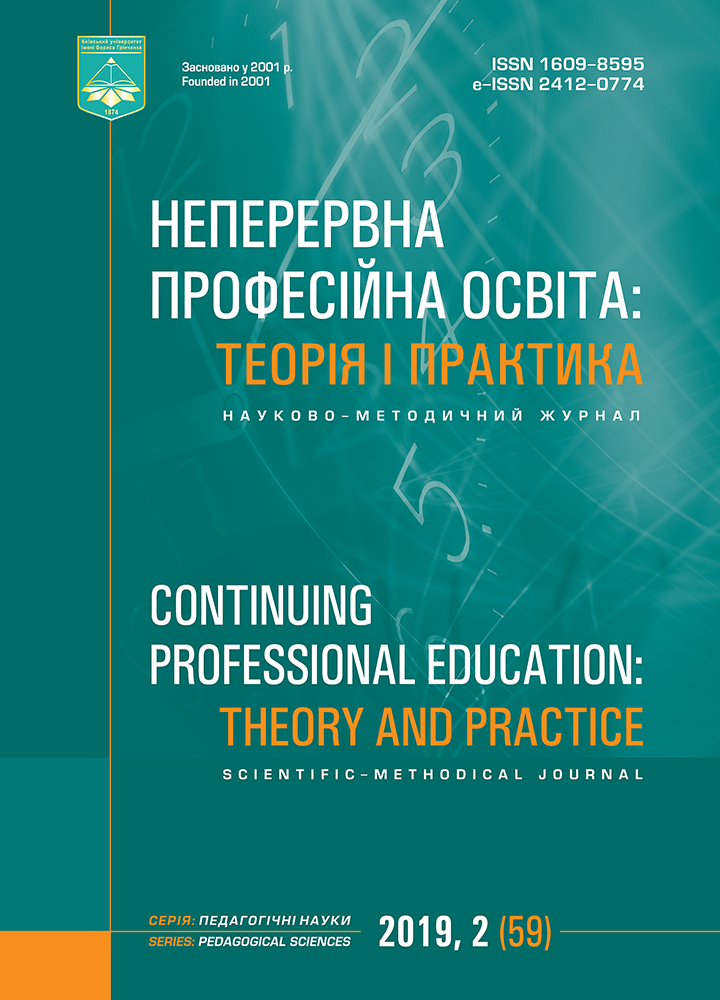FORMATION OF PROFESSIONAL COMPETENCE IN FUTURE SPECIALISTS FROM ENTREPRENEURSHIP, TRADE AND EXCHANGE ACTIVITIES: MORAL-ETHICAL COMPOSITION
DOI:
https://doi.org/10.28925/1609-8595.2019.2.4651Keywords:
ethics, mental and ethical qualities in future specialists from entrepreneurship, trade and exchange activity, methods of scientific research, morality, multy-degree system of education.Abstract
In the article attention is focused on one of the most important problems of formation of future specialist from entrepreneurship, trade and exchange activity – presence of the formed mental and ethical values. It is marked that trade and exchange activity require a presence in the personnel of such personality qualities as: discipline, politeness, responsibility, communicational skills, tactfulness, tolerance, being collected, exactness. They are formed in the process of theoretical-practical training of future specialist and directly because of atmosphere at the job. The aim of the article is to determine the essence and ways of forming of mental and ethical qualities in future specialists from entrepreneurship, trade and exchange activity. Maintenance of the key concept «mental and ethical values» is found out and the formulation is given. It is a presence of the formed common to all mankind values and norms of moral behaviour, which is predefined by modern European direction of integration in different spheres (educational, economic, humanitarian and others like that). Separate scientific investigation services are analysed. Researchers point out the importance of formation of mental and ethical values in future professional activity. In the process of research it is found out about content of curricula and working programs from professional disciplines, complex plans of educational work, directions of activity of a group; methodology of scientific research of the problem. Experimental work required determination of scientific methodologies of research. Author is distinguishing two methodologies: diagnostics of the ways person thinks (B. Bass), questionnaire methodology «Scale of emotional review» (A. Megrabyana and N. Epstein). Results certify that systematic work is needed in the process of preparation of future specialist in establishments of higher education. The separate ways of forming of mental and ethical values are found out in students: folk pedagogics, out-of-classroom (extracurricular) work, participation in business-tournaments. We see the prospects of further researches in certain methods of extracurricular work that will influence formation of personality.References
Vitvyczka, S. S. (2015). Aksiologichnyj pidhid do vyhovannya osobystosti majbutnogo vchytelya [Axiological approach to the upbringing of the future teacher’s personality]. Creative pedagogy, 10, 63–67 (ukr).
Elyseev, O. P. (2010). Praktykum po psyhologyy lychnosty [Workshop on human`s psychology]. Saint Petersburg, Russia: Pyter (rus).
Zhydeczkyj, Y. Cz. (2004). Rozvytok vidpovidalnosti osobystosti u stupenevij osviti. [Development of the responsibility of the person in the sedate education]. Visnyk of Lviv University. Pedagogical series, 18, 30–36 (ukr).
Zarva, O. M. (2011). Moralne vykhovannya studentiv vyshhykh navchalnykh zakladiv [Moral education of students in American higher educational institutions]. Extended abstract of candidate’s thesis: 13.00.01. Zhytomyr, Ukraine (ukr).
Oksenyuk, I. L. (2014). Porivnyalnyj analiz profesijnoyi pidgotovky majbutnih fahivciv z upravlinnya proektamy v tehnichnyh vyshhyh shkolah Ukrayiny ta zakordonom [Comparative analysis of professional training of future project management experts in Ukrainian and foreign technical high schools]. Visnik Nacionalnogo aviacijnogo universitetu. Seriya: Pedagogika. Psihologiya, 5. Retrieved from http://jrnl.nau.edu.ua/index.php/VisnikPP/ article/view/10159/13362 (ukr).
Oleksenko, R. I. (2013). Rol simyi v duhovnomu vyhovanni majbutnogo pidpryyemcya [The role of the family in the spiritual education of the future entrepreneur]. Visnik Dnipropetrovskogo universitetu. Series: Philosophy. Sociology.
Politology, 21, Issue 23 (2), 205–212. Retrieved from http://nbuv.gov.ua/UJRN/vdufsp_2013_21_23(2)__40 (ukr).
Ostapenko, O. I. (2016). Socialni cinnosti ta oriyentaciyi u profesijnij diyalnosti molodyh specialistiv, vypusknykiv vyshhyh navchalnyh zakladiv Ukrayiny [Social values and orientation in the professional activity of young specialists, graduates of higher educational institutions of Ukraine]. Visnik Nacionalnogo universitetu « Lvivska politehnika». Yuridichni nauki, 404–410. Retrieved from http://nbuv.gov.ua/UJRN/vnulpurn_2016_837_66 (ukr).
Palamar, S. P. (2017). Problema formuvannya duhovno-moralnyh cinnostej studentiv v umovah osvitnogo seredovyshha vyshhogo navchalnogo zakladu [The problem of formation of spiritual and moral values of students in the educational environment of a higher educational institutions]. Educological discourse, 3–4, 221–234. Retrieved from //nbuv.gov.ua/UJRN/osdys_2017_3-4_20 (ukr).
Polozhennya pro VI Vseukrayinskyj (II mizhnarodnyj) biznes-turnir «Strategiya firmy-2019» [Regulations on the VI All-Ukrainian (II International) Business Tournament «Strategy of the Firm-2019»]. Retrieved from http://kint.com. ua/tmp/SF2019/Pol_SF2019.pdf (ukr).
Timoshuk, G. V. (2014). Sutnist i struktura cinnisnogo stavlennya majbutnix ekonomistiv do profesijnoyi diyalnosti [The essence and structure of the relation of future economists to professional activity]. Pedagogichna osvita: teoriya i praktika, 17, 241–249 (ukr).
Toftul, M. H. (2014). Suchasnyj slovnyk z etyky [Modern Dictionary of Ethics: Dictionary]. Zhytomyr, Ukraine: ZhDU im. I. Franka (ukr).
Downloads
How to Cite
Issue
Section
License
Copyright (c) 2020 Svitlana Stebljuk

This work is licensed under a Creative Commons Attribution-NonCommercial 3.0 Unported License.



